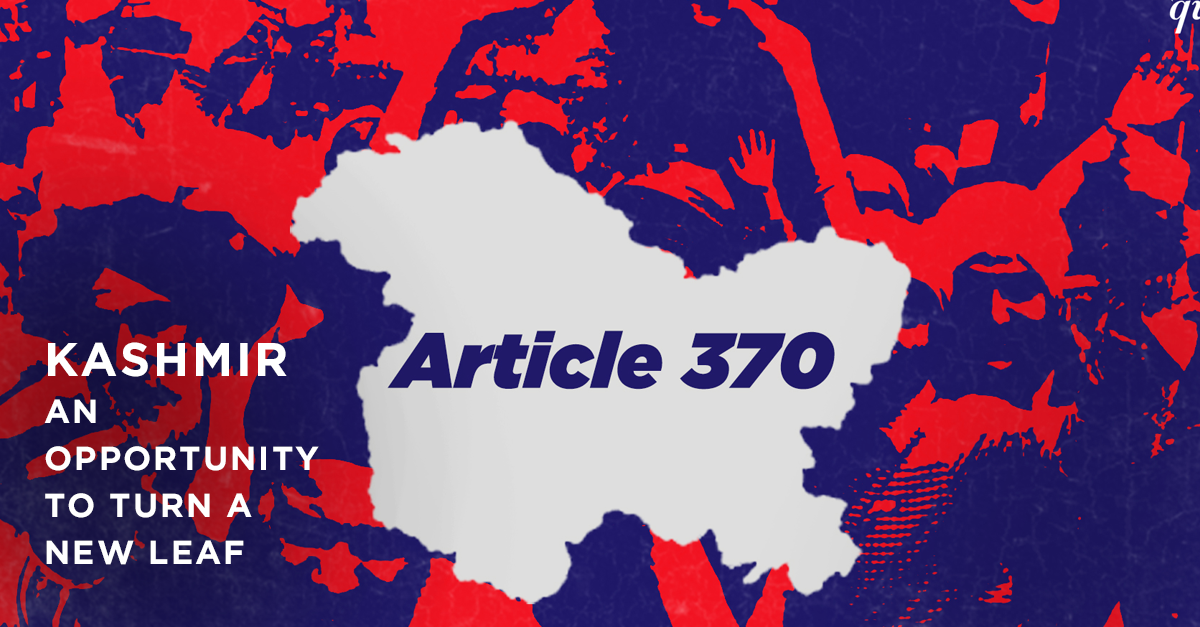The events we deem important enough to be part of our history, are chosen because they have either had an ongoing effect or changed the course of things in our journey to the present. In the case of positive effects, we tend to celebrate this cause and effect, but where outcomes are less than ideal we tend to use phrases such as ‘the burden of history’. For decades, Kashmir has been one of the regions of the world held captive by its past and vested political interests.
It’s certainly important to acknowledge the complexities of the issue, when considering the recent past of Kashmir and what the recent changes represent. However, in this blog I would like to instead focus on a commonsensical approach and how the new political arrangement can be used to bring an era of peace and prosperity to a region that has suffered for many decades. This is based partly on the fact that I am by no means an expert in the Indian constitution, or in the complicated recent history of Kashmir. More importantly, as a humanist and a believer in diversity and the greatest good of all, I strongly believe that the best path forward for humanity is one of living in harmony and acting for the common good.
The Constitution should be in the service of people, not the other way around
The first thing that comes to the mind of any Indian, if one mentions the year 1947, is the independence of India from British Rule. While this mental impression is usually overwhelmingly positive, it also hides the painful memory of the partition. Much could be written about the effects of the divide and rule policies that resulted in that traumatic event but, once again, that is not the purpose of these thoughts that I am sharing. For a number of reasons, Kashmir’s accession to India – which was in principle just like the hundreds of other princely states that did so – was turned into a far more complicated state of affairs, almost a decade after the event.
Having established a very basic background for what occurred in the past, I would now like to stick to the commonsense humanist approach that is my preference. Citizens of any country tend to be reverent about their constitution. This is natural, as it signifies their commitment to each other as well as the supreme law of the land. However, what should be done if the arrangements that have been made in a constitution fail to resolve a particular matter, even after having decades to do so?
It’s important to remember that a constitution is created by human beings, and no matter how well-meaning these persons are, they cannot foresee the future. This is why the process to make amendments and changes exists. Sometimes such changes are welcomed nearly universally and at other times there is a hue and cry. Having lived a bit of life and also having a keen history in the unfolding of history, I believe that how the abrogation of Article 370 is looked at a couple of decades from now, will depend on the outcomes that happen over that period. No matter how certain one feels of a political or ideological position at a given time, the truth is that as events unfold, perceptions change. The very narratives of history that we swear by in any given age, tend to evolve and change over time as well. So rather than become a captive of the best that our statesmen could do, at a given time, wisdom lies in learning from negative outcomes and making changes.
Creating room for a fresh approach
The simple truth is that the consequences of an initiative as groundbreaking as this cannot be judged in the short term. No doubt, opinions of all sort will pour a lot of ink and occupy a lot of bandwidth over the coming months and perhaps after that as well. However, the simple fact of the matter is that, as it stood, Article 370 was validating what can at best be called an impasse. As for its worst, violation of minority rights and the rights of women were only the tip of the iceberg. It’s not my contention that these negatives were created by the generation that added the article to the Indian Constitution, after all the article was amended around 65 times since its adoption. However, one thing that a reasonable human being can certainly say is that it became a tool for manipulation by vested interests, over the years.
This history of negatives is the reason why I am fundamentally optimistic about the removal of Article 370. A common quote makes the argument that madness consists of expecting a different result by trying the same thing for the umpteenth time. The new political arrangement will integrate Kashmir with far more investment capital, better organize its bureaucracy and – most important of all – remove discriminatory privileges and promote true equality in the eyes of the law of the land.
What the political impact of this move is remains to be seen. However, a clear change has been made from a past that was creating injustice, cynicism and pain. I believe all Indians – and even the international community – should now join hands to enable a new chapter in the history of Kashmir.

